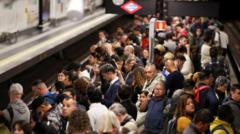In the wake of the outage, the Madrid metro system is operational again, and authorities are working diligently to address the aftermath. The failure was started by significant drops in power output, with Prime Minister Pedro Sánchez noting a 15 gigawatts drop at mid-day on Monday. Eduardo Prieto, from the grid operator Red Eléctrica, detailed how two rapid disconnections occurred, particularly in solar power-heavy regions, exacerbating the situation. Critical areas like the Canary Islands and parts of North Africa remained unaffected while the rest of Spain struggled.
The recovery process involved a careful staged approach to avoid overloading the grid, focusing initially on hydroelectric plants before gradually bringing other sources online, like combined-cycle gas plants. Nuclear reactors were paused during the blackout, complicating the recovery efforts. Support came from neighboring Morocco and France, with significant power transfers aiding Spain's eventual restoration. By early Tuesday, over 99% of power demand had been restored, although the economic cost of the blackout is estimated at €1.6 billion.
As political figures begin pointing fingers, with criticisms of the government’s handling of the situation, the Spanish public's resilience and solidarity during the crisis have drawn commendations. Emergency services and local communities came together to assist during the outages, even repurposing spaces such as conference centers to support those stranded.
Authorities, including Sánchez, have vowed to learn from this crisis and improve infrastructure, yet there are concerns about the nation's energy grid's capacity to manage its renewable energy reliance amidst safety declarations from previous years. As the nation continues to recover, the emphasis remains on avoiding future risks while adapting to changing energy demands.
The recovery process involved a careful staged approach to avoid overloading the grid, focusing initially on hydroelectric plants before gradually bringing other sources online, like combined-cycle gas plants. Nuclear reactors were paused during the blackout, complicating the recovery efforts. Support came from neighboring Morocco and France, with significant power transfers aiding Spain's eventual restoration. By early Tuesday, over 99% of power demand had been restored, although the economic cost of the blackout is estimated at €1.6 billion.
As political figures begin pointing fingers, with criticisms of the government’s handling of the situation, the Spanish public's resilience and solidarity during the crisis have drawn commendations. Emergency services and local communities came together to assist during the outages, even repurposing spaces such as conference centers to support those stranded.
Authorities, including Sánchez, have vowed to learn from this crisis and improve infrastructure, yet there are concerns about the nation's energy grid's capacity to manage its renewable energy reliance amidst safety declarations from previous years. As the nation continues to recover, the emphasis remains on avoiding future risks while adapting to changing energy demands.




















